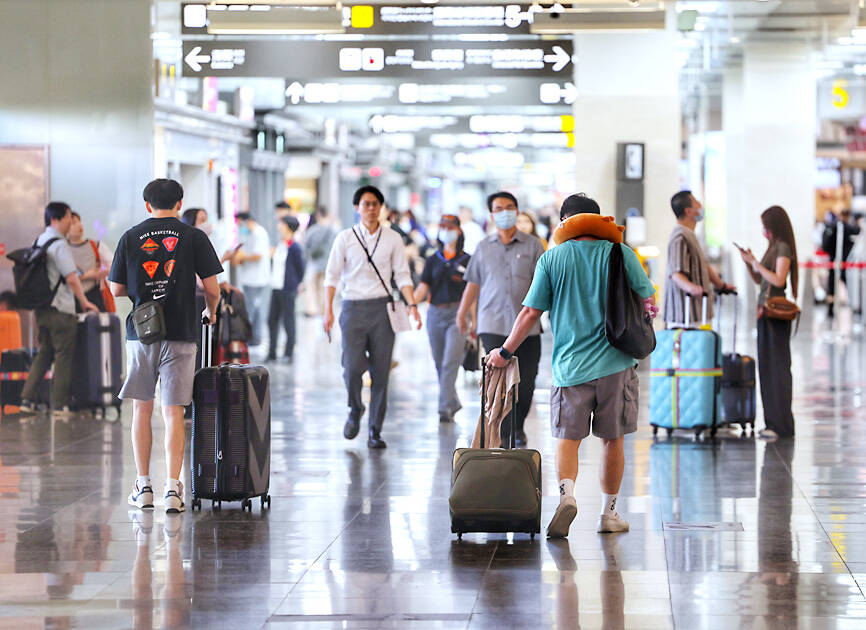Voluntary screenings for respiratory illnesses for people traveling from China, including Hong Kong and Macau, have begun in response to a surge of pneumonic diseases, the Centers for Disease Control (CDC) said yesterday.
The measures enacted on Sunday were part of an effort to monitor seven types of concerning pneumonic diseases surging in China, including Mycoplasma pneumoniae infections, influenza and COVID-19, CDC Deputy Director-General Philip Lo (羅一鈞) told a news conference at the Executive Yuan in Taipei.
No new cases of M. pneumonia infection were reported by the voluntary screenings of passengers from China arriving at the international airports in Taipei, Taoyuan, Taichung and Kaohsiung, he said.

Photo: CNA
The global respiratory disease season appears to have arrived early this year and the M. pneumoniae bacteria are expected to spread, but no new pathogen has been detected, he said, citing the WHO.
M. pneumonia infection poses a heightened risk to children, while COVID-19 remains a danger to adults, Lo said.
Meanwhile, domestic monitoring showed that community spread of respiratory diseases is declining, with the most common types of infection being influenza, adenovirus and parainfluenza, he said.
Communal cases of COVID-19 and emergency department visits for M. pneumoniae infection are “in flux,” he said, adding that data from one medical center suggest that the latter illness accounted for less than 1 percent of all respiratory cases.
Taiwan has enough medicine to treat M. pneumoniae cases in children following increased imports beginning last month, while a generic version of the drug is scheduled for domestic mass production beginning this month, he said.
Separately, Chinese Nationalist Party (KMT) Legislator Lin Wei-chou (林為洲) said that more should be done to bolster a reported insufficient supply of drugs to treat the disease, including antibiotics and fever medicines to handle a potential pandemic.
Doctors reporting to the lawmaker’s office said that they cannot obtain any imported antibiotics, while domestically produced ones are being rationed, Lin told a news conference at the Legislative Yuan in Taipei.
The Food and Drug Administration should set up a hotline for hospitals to request direct shipments of antibiotics as it would other medical supplies during an emergency, he said.
Clinics and hospitals have had difficulty acquiring fever syrup to treat M. pneumoniae cases in children for the past two months, pharmacist Shen Tsai-ying (沈采穎) said.
The government’s medicine platform is not useful for medical practitioners, as information about generic substitutes has not increased supplies, Shen said.
The unavailability of fever syrups could endanger children under six months should the pneumonia situation worsen, she said.

The brilliant blue waters, thick foliage and bucolic atmosphere on this seemingly idyllic archipelago deep in the Pacific Ocean belie the key role it now plays in a titanic geopolitical struggle. Palau is again on the front line as China, and the US and its allies prepare their forces in an intensifying contest for control over the Asia-Pacific region. The democratic nation of just 17,000 people hosts US-controlled airstrips and soon-to-be-completed radar installations that the US military describes as “critical” to monitoring vast swathes of water and airspace. It is also a key piece of the second island chain, a string of

A magnitude 5.9 earthquake that struck about 33km off the coast of Hualien City was the "main shock" in a series of quakes in the area, with aftershocks expected over the next three days, the Central Weather Administration (CWA) said yesterday. Prior to the magnitude 5.9 quake shaking most of Taiwan at 6:53pm yesterday, six other earthquakes stronger than a magnitude of 4, starting with a magnitude 5.5 quake at 6:09pm, occurred in the area. CWA Seismological Center Director Wu Chien-fu (吳健富) confirmed that the quakes were all part of the same series and that the magnitude 5.5 temblor was

The Central Weather Administration has issued a heat alert for southeastern Taiwan, warning of temperatures as high as 36°C today, while alerting some coastal areas of strong winds later in the day. Kaohsiung’s Neimen District (內門) and Pingtung County’s Neipu Township (內埔) are under an orange heat alert, which warns of temperatures as high as 36°C for three consecutive days, the CWA said, citing southwest winds. The heat would also extend to Tainan’s Nansi (楠西) and Yujing (玉井) districts, as well as Pingtung’s Gaoshu (高樹), Yanpu (鹽埔) and Majia (瑪家) townships, it said, forecasting highs of up to 36°C in those areas

IN FULL SWING: Recall drives against lawmakers in Hualien, Taoyuan and Hsinchu have reached the second-stage threshold, the campaigners said Campaigners in a recall petition against Chinese Nationalist Party (KMT) Legislator Yen Kuan-heng (顏寬恒) in Taichung yesterday said their signature target is within sight, and that they need a big push to collect about 500 more signatures from locals to reach the second-stage threshold. Recall campaigns against KMT lawmakers Johnny Chiang (江啟臣), Yang Chiung-ying (楊瓊瓔) and Lo Ting-wei (羅廷瑋) are also close to the 10 percent threshold, and campaigners are mounting a final push this week. They need about 800 signatures against Chiang and about 2,000 against Yang. Campaigners seeking to recall Lo said they had reached the threshold figure over the